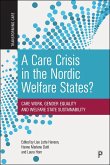The European welfare systems, established after the Second World War, have been under sustained attack since the late 1970s from the neoliberal drive towards a small state and from the market as the foremost instrument for the efficient allocation of scarce resources. After the 2008 financial crash, Europe's high tax and generous benefits welfare states were, once again, blamed for economic stagnation and political immobilism. If anything, however, the long decade of the Great Recession proved that the welfare state remained a fundamental asset in hard times, stabilizing the economy, protecting households and individuals from poverty, reconciling gendered work and family life, while improving the skills and competences needed in Europe's knowledge economy and ageing society. Finally, the spread of the Covid-19 pandemic has, unsuprisingly, brought back into the limelight the productive role of welfare systems in guaranteeing basic security, human capabilities, economic opportunities, and democratic freedoms.
In this important contribution, Anton Hemerijck and Robin Huguenot-Noël examine the nature of European welfare provision and the untruths that surround it. They evaluate the impact of the austerity measures that followed the Great Recession, and consider its future design to better equip European societies to face social change, from global competition to accelerated demographic ageing, the digitalization of work and climate change.
In this important contribution, Anton Hemerijck and Robin Huguenot-Noël examine the nature of European welfare provision and the untruths that surround it. They evaluate the impact of the austerity measures that followed the Great Recession, and consider its future design to better equip European societies to face social change, from global competition to accelerated demographic ageing, the digitalization of work and climate change.
Dieser Download kann aus rechtlichen Gründen nur mit Rechnungsadresse in A, D ausgeliefert werden.









